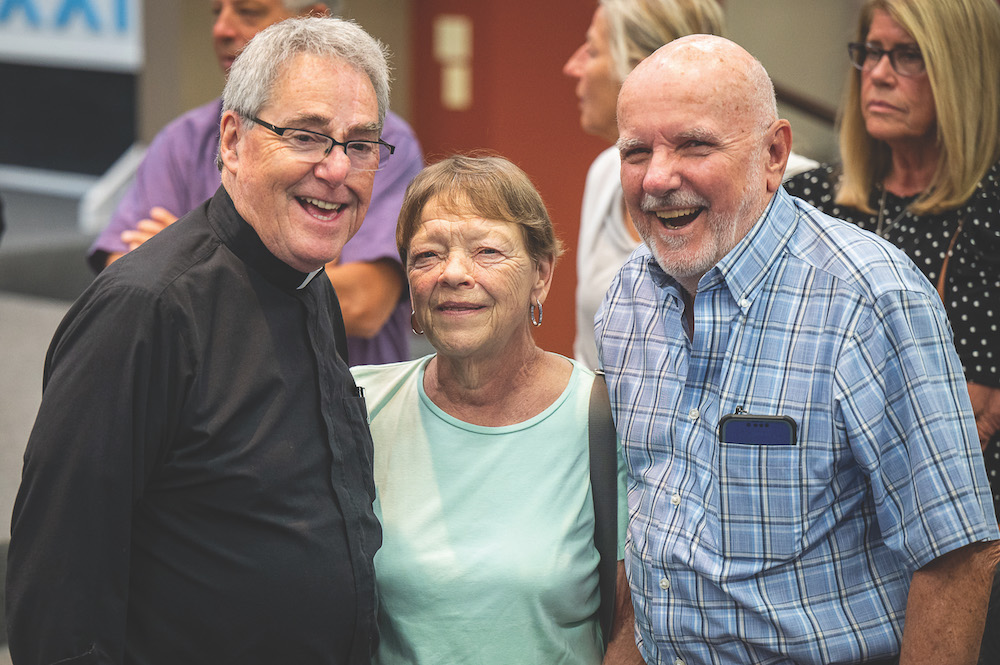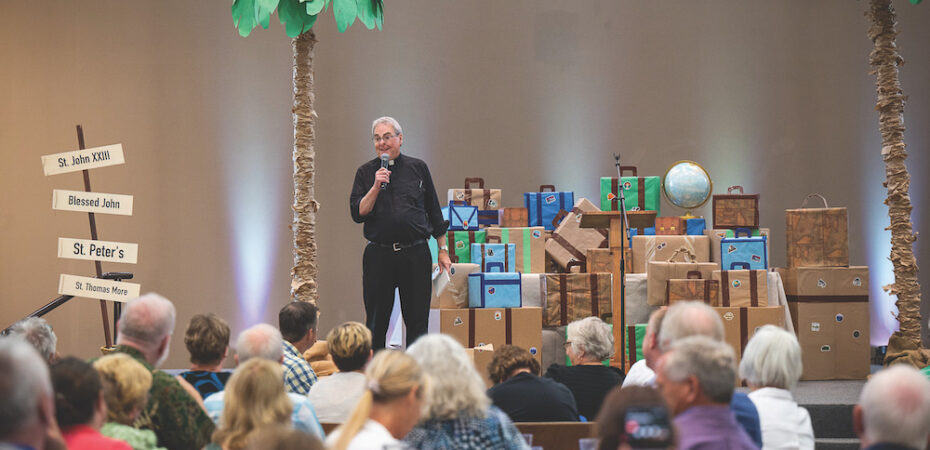Dealing with Grief in Priestly Retirement
A new chapter in life to focus on being a man of God
Father Herb Weber Comments Off on Dealing with Grief in Priestly Retirement
Since my transition last summer to “senior status,” as our diocese calls retired priests, I have often been asked how I like retirement. Most of the time I answer honestly, saying that I am enjoying the time even as I adjust to a new chapter of my life. For me, the retirement experience came after 48 years of active ministry.
What I don’t tell people, and only realize myself after some reflection, is that I also spent — and continue to spend — time grieving, which in itself is a process.
Learning about Grief
Priests become something of experts when it comes to grief. Through all the deaths of parishioners, pastors become aware of the pain and sorrow that may be involved. They also know that acceptance of a new way of life can be challenging. Priests often help people deal with grief by walking the journey with them, listening and helping those who are grieving find a new way to live.
In addition, as caring pastors, we also face our own grief. It’s not uncommon that the deaths of parishioners of all ages affect us. Even when I have shared spiritual and emotional strength with others, I have faced pain in myself. When Hope, a 17-year-old born with Fanconi anemia, died of kidney failure, I cried along with her family and friends. And when Tommy, a 90-year-old, high-profile personality of the parish passed, I knew that I had just lost a friend.
Added to that, there is a type of grief that comes when leaders within the parish tell you they are moving elsewhere because of job relocation or to be closer to family. That they regret leaving your church is often only small consolation.
For sure, priests know a lot about grief. Yet I have never read anything about the grieving process associated with retiring. Grief that comes with retirement can be puzzling because priests don’t expect it or because no one seems to acknowledge it when farewell talks are being given. Most well-wishers emphasize the accomplishments or the joy of an unscheduled life.

Many Shades
I admit there is much that I like about senior status, including a lighter schedule, the ability to assist neighboring pastors by celebrating Mass at their parishes, and finding a renewed appreciation for priesthood apart from being an administrator. At the same time, I admit I have suffered a significant loss, sometimes hitting me hard.
As my 75th birthday approached, I knew in my heart it was time to offer my resignation as pastor of St. John XXIII Parish, where I was both founder and the only pastor for 17 years. Consequently, my relationship with the parish and its members ran very deep.
Even though I consciously chose to retire and knew it was good for both me and the parish, there are all the hallmarks related to grief: a deep yearning to be back with those I love, some regret that I can’t still be there for those special and important moments, and even a bit of sadness anytime I hear that life at the parish is going on (very well) without me at the helm.
Not every person who retires may experience grief the way that I have. They may be much more aware of relief or jubilation of accomplishment. Yet I suspect that priests who retire or face retirement need to be conscious of this process.
Components of Grief
I break the grief experience into several components, each of which also offers a challenge to help me work through this grief.
First, there is the very tangible and concrete change that takes place when most priests retire — that is, they need to move out of the housing provided by the parish. Many in other professions don’t have this additional letting go when they leave their positions. It’s not simply moving away from a house, but the very lifestyle that has become part of a priest’s experience. Personally, I found excitement in searching for a new place to live. There was a spirit of adventure even as it was overwhelming. Fortunately, several members of the parish were there to assist me.
This aspect of letting go should not be overlooked because, even for the least materialistic of priests, it is a reminder that most people come to depend on having a home base, a place of shelter and protection. Along with the housing itself, there is the letting go of security, since most of our lives we have known that our parishes have the responsibility to provide for their pastors.
Dealing with this loss, I found a need to be open and surrender to the unknown. Each time in my life I have moved — from leaving home to go to the seminary, from seminary into priesthood, and from assignment to assignment — there has had to be an act of faith. Like the Church calling itself a pilgrim Church, I try to see these moves as times of new discovery. If our faith reminds us that we are not permanent citizens of this world, those moves can be fitting reminders of such.
In addition to this most basic letting go, there is the loss of identity as a pastor. Although most priests, including me, have not relished wearing the administrator hat, I can say that pastoring has been a joy. I have accepted the mission of the parish and have taken to heart the parish vision, ready to share it with others. I’d like to think that I never felt that I had to have the final word in all decisions, but I liked knowing that I could share with the people a particular approach to being Church.
Instead of being a priest-pastor, I am starting to focus on being a priest as a man of God. In other words, my new emphasis has to be on who I am and not simply on the role that I have joyfully accepted all these years. I still have many opportunities to be pastoral, but now that ministry is flowing from priesthood itself and not from some position to which I have been assigned.
Finally, and this is major, I grieve seeing parishioners who have been a significant part of my life. Over the years, I have had the opportunity to be present with families at celebrations of sacraments and other moments of joy. I have also shared pain and sorrow, sometimes just sitting with people at critical times. Mostly, though, I have felt that I was part of many families. Not seeing people on a regular basis has left a gaping hole in my heart.
I don’t want to deny this loss or pain. I also know that it will never be the same as it was. Borrowing from Thomas Wolfe, you can’t go home again! That is part of the grief that comes with retirement.
In Church circles, it seems advisable for the one who has just retired to step aside so the new pastor can find his way. When I do see former parishioners at receptions, concerts or coffee shops, there are great moments of joy for both them and me. I suspect some friendships will continue while other relationships will give way as the days and weeks pass.
I often find myself focusing on the younger children of the parish, especially the preschoolers whom I saw weekly. One mother told me that her 4-year-old son couldn’t grasp the idea that I was not going to be there on a regular basis. I wanted to remind the child that I still love him and his family. The people of the parish continue to be important to me.
Three Ways of Dealing with Grief
That sentiment has also allowed me to highlight three ways of dealing with this part of grief. On one hand, I recall in prayer those who have been an important part of my life, asking that they continue to be blessed. This is not simply a pro forma prayer, but rather an active way of presenting to God those I cannot see and be with.
I also count my blessings, that I have been able to be with such fine fellow disciples over the years. The way I chose to look at pastoring was to be a part of the community that I served, not apart from them. This attitude may cause more pain at these moments, but the blessings have been bountiful.
Then I realize that I can find appropriate ways to reach out, ways that remind people that my pastoral ministry wasn’t just a job. For example, over the years, when I saw in the newspaper that some high school students whom I had known for years were being honored, I made it a point to send them some notes. I knew my words would be well-received and helpful to these teens; I also knew it was important to me to let them know I was happy for them.
In a recent conversation with a businessman who was looking ahead to his own retirement, I tried to explain the joys and challenges I have faced. When I addressed not being with the people of the parish in an ongoing way, he immediately said that it sounded like grief. Then he offered insights that we men of faith often preach the need not to be owned by this earth and what it has to offer. That helped provide a context for me to let go in ways I had never anticipated as I continue to look at what priesthood is all about and what we may face as we retire.
FATHER HERB WEBER is a retired priest from the Diocese of Toledo. He was ordained in 1974.
…………………………………………………………………………………………………………………………………………….
Pope Francis’ Message about Retirement
Speaking on the topic of old age and retirement, Pope Francis, in his General Audience on May 11, 2022, said: “For many people, the prospect of retirement coincides with that of a deserved and long-awaited rest from demanding and wearisome activities. But it also happens that the end of work can be a source for worry, and is accompanied with some trepidation. ‘What will I do, now that my life will be emptied of what filled it for so long?’ This is the question. Daily work also means a set of relationships, the satisfaction of earning a living, the experience of having a role, well-deserved recognition, a time that is full that goes beyond working hours alone. …
“But, let us ask ourselves: Are we making this effort to ‘reshape’? Or do we simply suffer the inertia of material and economic conditions? The co-presence of generations is, in fact, lengthening. Are we all trying together to make these conditions more human, more loving, more just, in the new conditions of modern societies?”
……………………………………………………………………………………………………………………………………………..





